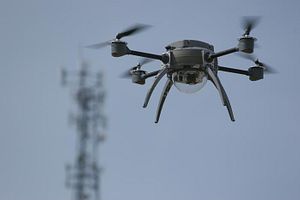India’s Directorate General of Infantry has issued a request for information (RFI) for 600 mini-unmanned aerial vehicles (UAVs). The RFI is to be followed up by a request for proposals (RFP) later this year. The initial RFI requires that manufacturers bidding for the Indian UAV contract must co-develop their offering with a partnered Indian company, in line with New Delhi’s new “Make in India” initiative, a drive to boost India’s domestic manufacturing base in defense and other sectors. The Army’s RFI for mini-UAVs comes after a similar move by the Directorate of Naval Air Staff, which has sought UAVs for maritime patrol use. According to Aviation International News, the bids will be presented by the Indian partner companies.
Currently, two Israeli firms, Aeronautics and Elbit Systems, and two U.S. firms, Boeing and AeroVironment, will be responding to the RFI. According to the AIN report, Elbit “might team with Hindustan Aeronautics Ltd (HAL).” Boeing, which is expected to offer the Scan Eagle, is partnered with Tata Advanced Systems. AeroVironment, meanwhile, announced a UAV partnership with Dynamatic Technologies—the companies are co-developing the Cheel UAV, a “pathfinder project” under the U.S.-India Defense Technology and Trade Initiative (DTTI). Aeronautics has yet to find an Indian partner, AIN reports.
A Defense World report from earlier in August highlighted the RFI’s specific compliance parameters. According to the Indian Army’s RFI, “Mini UAVs are fixed and hence need to be complied with in totality. Details of systems being provided in subsequent parts of RFI must pertain to only those systems which are fully compliant to parameters.” AIN outlines the compliance requirements of the mini-UAV RFI:
To be compliant, mandatory features for each system includes three UAVs; a man-portable ground control station; launch and recovery systems where required; three sets of sensor packages with an all-weather day and night capability; two-way data relay (including beyond-line-of-sight control of the UAV); spare batteries for theUAVs and battery chargers.
UAVs are beginning to play a greater role in India’s defense planning. The relatively cheap UAV represents a viable way for New Delhi to conduct effective maritime patrols of critical sea lanes (hence the Navy’s earlier RFI) and to monitor its contested land borders with Pakistan and China. Indeed, a drone was at the center of a recent controversy with Pakistan after Pakistani authorities claimed they had shot down an India drone, which was likely a commercial drone. Indian Foreign Secretary S. Jaishankar told the press that the drone was not of “any UAV category held in the inventory of the Indian armed forces.” Saurav Jha, writing for The Diplomat earlier this year, identified some of the challenges for New Delhi in pursuing UAVs.
































